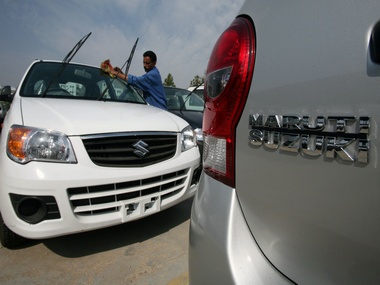New Delhi: Every third car Maruti Suzuki India sold in May was a diesel one, compared to less than one in five two years back.
While the overall passenger car market is moving very rapidly in favour of diesel, production constraints for diesel engines have meant Maruti’s share in the diesel market is lower. Managing Director Shinzo Nakanishi said on Tuesday that diesel car penetration reached 55 percent in May for the overall market but for Maruti it remained at 38.5 percent. The company has already decided to increase diesel powertrain capacity by another three lakh units in two phases to take it to six lakh units eventually at an investment of around Rs 1,700 crore.
[caption id=“attachment_341203” align=“alignleft” width=“380” caption=“Reuters”]  [/caption]
But with such rapid increase in dieselisation of the passenger car market, it is no wonder that Maruti has been forced to cut production of petrol cars. Managing Executive Officer (Production) MM Singh said that the company is using only 70 percent of its petrol engine capacity of 11 lakh units on an annualised basis. He also said that a sharp fall in the combined sales of the Alto and Wagon R is the reason behind this decline. These cars do not come with a diesel option.
At its peak in 2010-11, Alto was selling about 30,000 units a month but now sales are averaging only around 22,000 units a month. Maruti said at the beginning of this fiscal it would produce 50,000 less petrol cars in 2012-13, but if it is making 30 percent less petrol engines already, its petrol car production cut would be much higher than the 50,000 unit number given earlier. Maruti’s petrol cars - Alto, Wagon R, A-Star, 800 and Zen Estilo - have found few takers over the last few quarters after petrol prices were hiked several times.
Most recently petrol prices were hiked by as much as Rs 7.5 a litre last month. Although oil marketing companies have since cut prices by Rs 2 a litre, a lot of car buyers are now preferring diesel vehicles due to the huge price difference (around Rs 30) between petrol and diesel.
Impact Shorts
More ShortsMaruti has also announced that it is merging Suzuki Powertrain India Ltd (SPIL) with itself. SPIL is a profitable diesel powertrain manufacturer and the merger will not only generate greater synergies but also strengthen Maruti’s balance-sheet. In today’s diesel crazy market, increased focus on diesel is a no-brainer.
SPIL was set up in 2006 when diesel penetration was minuscule in the Indian market and this project was capital-intensive, which is why Maruti’s parent Suzuki Motor Co held a majority 70 percent equity of SPIL. Nakanishi said with such emphasis on diesel in the Indian market, it made a lot of sense to get management control in this venture.
Maruti’s petrol debacle has continued through April and May this fiscal with mini car sales (M800, A-Star, Wagon R and Alto) tumbling 27 percent year-on-year to 60,615 units. On the other hand, demand for the diesel variants of the Swift hatchback, new compact DZire and recently launched Ertiga MUV have outstripped supply. Sales of Swift DZire accelerated 47 percent to 33,217 units and compact car sales led by the Swift rose 28 percent to 50,362 units. Driven by Ertiga, utility vehicle sales have seen over a 10-fold jump in the last two months to 13,327 units.


)

)
)
)
)
)
)
)
)



